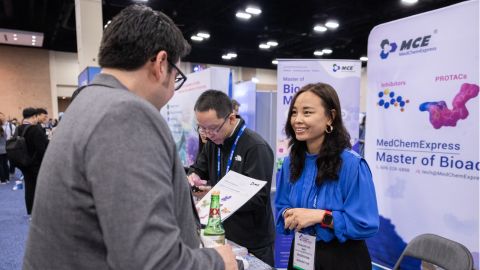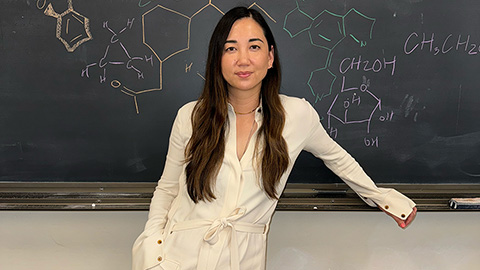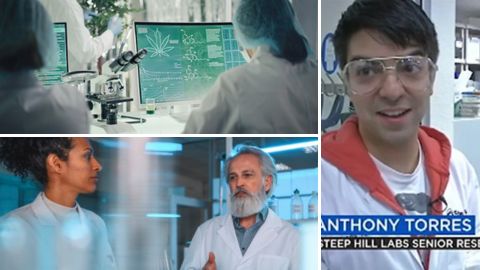Giving labs the tools to be successful
For almost three decades, Douglas Storts has been developing tools for genetic amplification at the reagent supply company Promega in Madison, Wisconsin. "I've enjoyed working on lots of projects," he said. "There's been a huge variety over the years."

Name: Douglas Storts
Current position: Head of Research, Nucleic Acid Technologies, Promega Corporation
Career path: Ph.D., microbiology, Miami University, 1980
Postdoctoral research: University of Chicago
First job outside of academia: Ambion, a molecular biology startup in Austin, Texas
Favorite molecule: DNA
According to Storts, the throughline that ties his group's work on genetic changes in astronauts to cancer diagnostics is that they always are working to solve puzzles. ASBMB Today caught up with him for the latest in our series on industry careers. This interview has been condensed and edited.
As the head of research in nucleic acids at Promega, what do you work on?
I manage a group of about two dozen scientists working on projects related to nucleic acid amplification and genotyping. The products we develop are used for forensic testing, molecular diagnostics and also in the life science research community. We develop tools that we can give to laboratories across the world and enable them to be successful.
What's most challenging about your work?
With some of these assays, we're looking at 30 or more different targets in the genome in a single amplification reaction that has to be extremely robust and extremely efficient. We need to reliably detect copies of DNA every time, time after time. In forensic tests, the samples are almost unimaginable. Whatever they find at a crime scene, in whatever quantity, they want to test it: telephones, bloodspots, bodies — anything.
How did you come to work at Promega?
I recognized early on that I was not interested in an academic position. After I received my Ph.D. and did a postdoc, I went to a small startup company in Austin, Texas, for about two years. I transferred to Promega in 1991 based on a recommendation from a recruiter. I have not looked back.
What traits do you look for in a potential hire?
No. 1 skill: communication. It would be great to have somebody come in with a technical background exactly aligned with what I need. That rarely happens. So what I want is somebody who has good communication skills who can take direction without being offended and can reach out for help when they have any questions. I can teach anyone to do almost anything. They have to be able to listen.
This second skill is being able to think outside the box. If somebody thinks A plus B must equal C, then if A plus B equals anything other than C, they're totally flustered. When you show them they've walked into this with a box around their thoughts and the data clearly indicate the answer lies outside of the box, they begin to understand: You've got to think outside the box to solve complex problems.
What career advice do you give young scientists?
Work hard. Be creative. Be a team member. My perception is there are a lot of folks that have a big gap in one of those three areas.
(Would you like to suggest an ASBMB member who works in industry for a Five Questions interview? Send an email to ASBMB Today.)
Enjoy reading ASBMB Today?
Become a member to receive the print edition four times a year and the digital edition monthly.
Learn moreGet the latest from ASBMB Today
Enter your email address, and we’ll send you a weekly email with recent articles, interviews and more.
Latest in Industry
Industry highlights or most popular articles

Black excellence in biotech: Shaping the future of an industry
This Black History Month, we highlight the impact of DEI initiatives, trailblazing scientists and industry leaders working to create a more inclusive and scientific community. Discover how you can be part of the movement.

Attend ASBMB’s career and education fair
Attending the ASBMB career and education fair is a great way to explore new opportunities, make valuable connections and gain insights into potential career paths.

Benefits of attending a large scientific conference
Researchers have a lot of choices when it comes to conferences and symposia. A large conference like the ASBMB Annual Meeting offers myriad opportunities, such as poster sessions, top research talks, social events, workshops, vendor booths and more.

Biotech startup worms its way into therapeutics
Andrea Choe's company, Holoclara, has created an anti-inflammatory drug based on a molecule from worms.

How military forensic scientists use DNA to solve mysteries
Learn how two analysts at the Armed Forces DNA Identification Laboratory use molecular biology and genetics to identify the remains of fallen troops.

Careers in industry: A year in review
Careers columnist Inayah Entzminger looks back at 12 months of interviews, advice and lists of resources.

